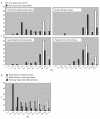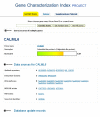Gene characterization index: assessing the depth of gene annotation
- PMID: 18213364
- PMCID: PMC2194620
- DOI: 10.1371/journal.pone.0001440
Gene characterization index: assessing the depth of gene annotation
Abstract
Background: We introduce the Gene Characterization Index, a bioinformatics method for scoring the extent to which a protein-encoding gene is functionally described. Inherently a reflection of human perception, the Gene Characterization Index is applied for assessing the characterization status of individual genes, thus serving the advancement of both genome annotation and applied genomics research by rapid and unbiased identification of groups of uncharacterized genes for diverse applications such as directed functional studies and delineation of novel drug targets.
Methodology/principal findings: The scoring procedure is based on a global survey of researchers, who assigned characterization scores from 1 (poor) to 10 (extensive) for a sample of genes based on major online resources. By evaluating the survey as training data, we developed a bioinformatics procedure to assign gene characterization scores to all genes in the human genome. We analyzed snapshots of functional genome annotation over a period of 6 years to assess temporal changes reflected by the increase of the average Gene Characterization Index. Applying the Gene Characterization Index to genes within pharmaceutically relevant classes, we confirmed known drug targets as high-scoring genes and revealed potentially interesting novel targets with low characterization indexes. Removing known drug targets and genes linked to sequence-related patent filings from the entirety of indexed genes, we identified sets of low-scoring genes particularly suited for further experimental investigation.
Conclusions/significance: The Gene Characterization Index is intended to serve as a tool to the scientific community and granting agencies for focusing resources and efforts on unexplored areas of the genome. The Gene Characterization Index is available from http://cisreg.ca/gci/.
Conflict of interest statement
Figures






Similar articles
-
GIFtS: annotation landscape analysis with GeneCards.BMC Bioinformatics. 2009 Oct 23;10:348. doi: 10.1186/1471-2105-10-348. BMC Bioinformatics. 2009. PMID: 19852797 Free PMC article.
-
An Experimental Approach to Genome Annotation: This report is based on a colloquium sponsored by the American Academy of Microbiology held July 19-20, 2004, in Washington, DC.Washington (DC): American Society for Microbiology; 2004. Washington (DC): American Society for Microbiology; 2004. PMID: 33001599 Free Books & Documents. Review.
-
Folic acid supplementation and malaria susceptibility and severity among people taking antifolate antimalarial drugs in endemic areas.Cochrane Database Syst Rev. 2022 Feb 1;2(2022):CD014217. doi: 10.1002/14651858.CD014217. Cochrane Database Syst Rev. 2022. PMID: 36321557 Free PMC article.
-
A procedure for assessing GO annotation consistency.Bioinformatics. 2005 Jun;21 Suppl 1:i136-43. doi: 10.1093/bioinformatics/bti1019. Bioinformatics. 2005. PMID: 15961450
-
Evidence-based gene models for structural and functional annotations of the oil palm genome.Biol Direct. 2017 Sep 8;12(1):21. doi: 10.1186/s13062-017-0191-4. Biol Direct. 2017. PMID: 28886750 Free PMC article.
Cited by
-
Systems medicine: the future of medical genomics and healthcare.Genome Med. 2009 Jan 20;1(1):2. doi: 10.1186/gm2. Genome Med. 2009. PMID: 19348689 Free PMC article.
-
GIFtS: annotation landscape analysis with GeneCards.BMC Bioinformatics. 2009 Oct 23;10:348. doi: 10.1186/1471-2105-10-348. BMC Bioinformatics. 2009. PMID: 19852797 Free PMC article.
-
Re-annotation is an essential step in systems biology modeling of functional genomics data.PLoS One. 2010 May 14;5(5):e10642. doi: 10.1371/journal.pone.0010642. PLoS One. 2010. PMID: 20498845 Free PMC article.
-
Synthetic lethality guiding selection of drug combinations in ovarian cancer.PLoS One. 2019 Jan 25;14(1):e0210859. doi: 10.1371/journal.pone.0210859. eCollection 2019. PLoS One. 2019. PMID: 30682083 Free PMC article.
-
Searching for signaling balance through the identification of genetic interactors of the Rab guanine-nucleotide dissociation inhibitor gdi-1.PLoS One. 2010 May 13;5(5):e10624. doi: 10.1371/journal.pone.0010624. PLoS One. 2010. PMID: 20498707 Free PMC article.
References
Publication types
MeSH terms
Grants and funding
LinkOut - more resources
Full Text Sources

